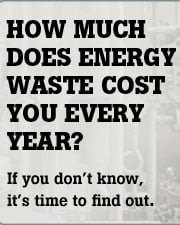
Managing energy efficiency in your facility can save money. Conducting an energy inspection can show you how to reduce energy costs by up to 25 percent.
Energy is a critical issue for facilities around the world. Undiscovered and uncorrected energy waste represents tremendous potential savings. The resources provided in the Fluke Energy Resource Center will help you use measurement data to support the decisions and actions that reduce energy consumption and cost, while increasing energy efficiency, by focusing on issues such as:
- Equipment upgrade analysis and ROI
- Supply/demand right-sizing and optimization
- Justification for introducing controls and automation
- Applications for utility incentives
- Repairs
Energy basics
What is energy?
- Energy is measured in Joule (j).
- The energy of one Joule in one second = one Watt (W).
- We use energy to produce work.
- When we do, a part of the original energy is transformed into thermal energy.
- We call that energy loss and the amount of that loss defines the efficiency of a process.
- Ideal electric motor efficiency is 80 to 90 percent.
- That means 80 to 90 percent of the electrical energy is transformed into work and 10 to 20 percent into heat.
- If a motor gets warmer than it should, efficiency decreases and energy is wasted.
- How much you can you save depends on size and age, on type of facility, and on scope of energy logging.
- Facilities with good proactive, condition-based maintenance programs can expect to identify savings of 10 to 20 percent.
- Facilities where maintenance still fights a lot of crises can identify savings of up to 30 percent.
Why the Fluke Energy Resource Center?
The materials in the resource center were designed to help you measure energy efficiency, design an energy measurement program for your facility, and justify the program to management. Review the case studies and success stories to see how other professionals conducted energy management programs and what they learned, view videos and webinars on how you can manage energy efficiency, use the checklists for step-by-step instructions on what should be checked when measuring energy consumption. The Interactive illustrations guide you through a facility to see locations of potential energy loss. If you want in-depth information sign up for an energy solutions